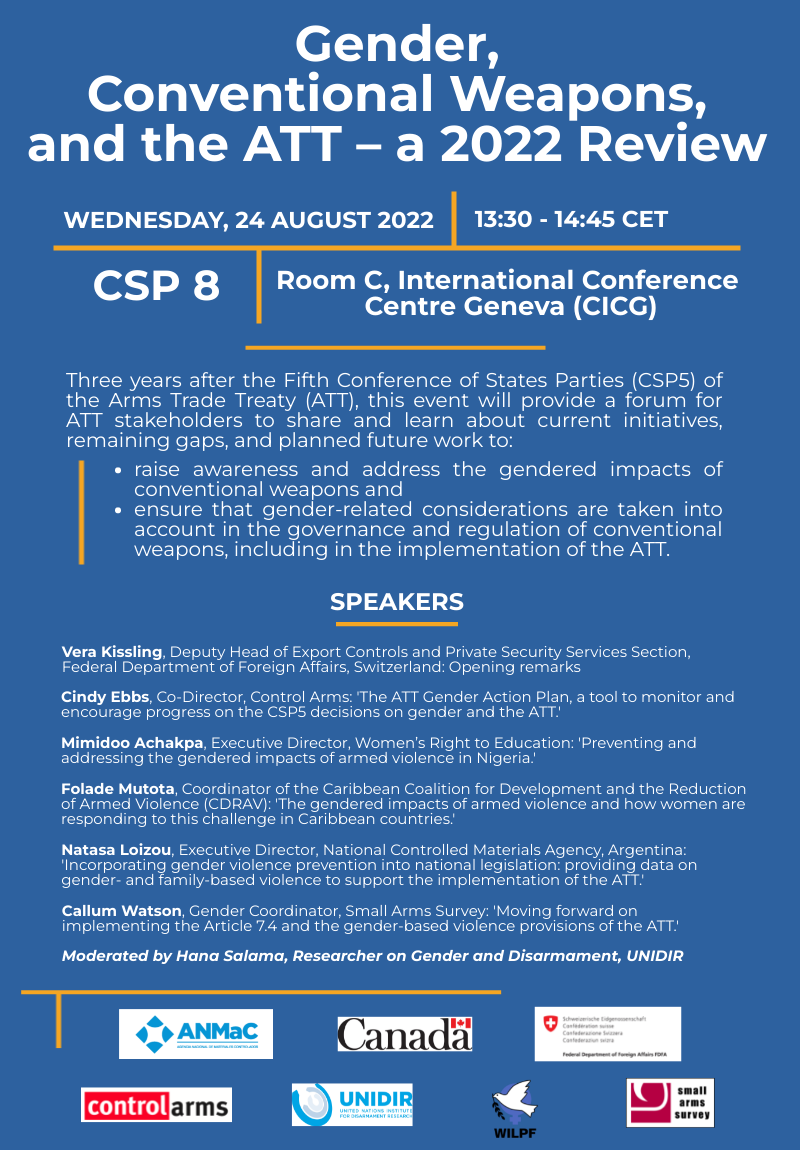
Gender, Conventional Weapons and the ATT – a 2022 Review
Wednesday 24 August 2022 - 13:00-14:45 Geneva time/CEST | In-person CSP 8 side event
Room C, International Conference Centre Geneva (CICG) | 17 rue de Varembé, 1211 Geneva
Three years after the Fifth Conference of States Parties (CSP5) of the Arms Trade Treaty (ATT), this event will provide a forum for ATT stakeholders to share and learn about current initiatives, remaining gaps, and planned future work to:
- raise awareness and address the gendered impacts of conventional weapons and
- ensure that gender-related considerations are taken into account in the governance and regulation of conventional weapons, including in the implementation of the ATT.
Detailed description
The Arms Trade Treaty is the first international treaty to include specific provisions on gender based violence in its legal framework (Article 7.4). As a result, the ATT has been a useful forum for examining how states and organizations work to address the gendered impact of conventional weapons in all aspects of ATT implementation and beyond.
The thematic discussion on gender and gender based violence at CSP 5 marked a significant milestone for gender in the implementation of the ATT and resulted in the adoption of a list of recommendations related to gender and gender-based violence by member states. Three years later, on the occasion of CSP8, it is time to take stock of the progress made so far by states and their partner organizations, but also the challenges encountered and the lessons learnt.
At this event, participants will have the opportunity to learn from a variety of stakeholders about their current research, outreach and other types of support related to gendered aspects of the ATT. The speakers and participants will then be invited to identify overall objectives to guide future work in this area, discuss where the gaps lie, and suggest ways to fill these gaps in the coming year.
Brief presentations will be organized around three broad themes that were discussed at CSP5:
1. Women’s meaningful participation and representation in ATT related-events
The discussion will focus on good practices to reach a greater gender balance in meetings and to improve women’s meaningful participation in ATT-related meetings.
2. The gendered impact of armed violence in the context of the ATT
The discussion will explore techniques and good practices related to the collection gender-disaggregated data and use of gender analysis to better understand the differential impact of conventional weapons on men, women, boys and girls.
3. Gender perspectives in the implementation of the ATT incl. through Article 7.4
The discussion will center on gender-based considerations in export risk assessments under articles 6 and 7, and the challenges faced by export officers in terms of data access and decision-making.
Speakers
- Vera Kissling, Deputy Head of Export Controls and Private Security Services Section, Federal Department of Foreign Affairs, Switzerland: Opening remarks
- Cindy Ebbs, Co-Director, Control Arms: 'The ATT Gender Action Plan, a tool to monitor and encourage progress on the CSP5 decisions on gender and the ATT.'
- Mimidoo Achakpa, Executive Director, Women’s Right to Education: 'Preventing and addressing the gendered impacts of armed violence in Nigeria.'
- Folade Mutota, Coordinator, Caribbean Coalition for Development and the Reduction of Armed Violence (CDRAV): 'The gendered impacts of armed violence and how women are responding to this challenge in Caribbean countries.'
- Natasa Loizou, Executive Director, National Controlled Materials Agency, Argentina: 'Incorporating gender violence prevention into national legislation: providing data on gender- and family-based violence to support the implementation of the ATT.'
- Callum Watson, Gender Coordinator, Small Arms Survey: 'Moving forward on implementing the Article 7.4 and the gender-based violence provisions of the ATT.'
Moderated by Hana Salama, Researcher on Gender and Disarmament, UNIDIR
- Download the event flyer (pdf version)